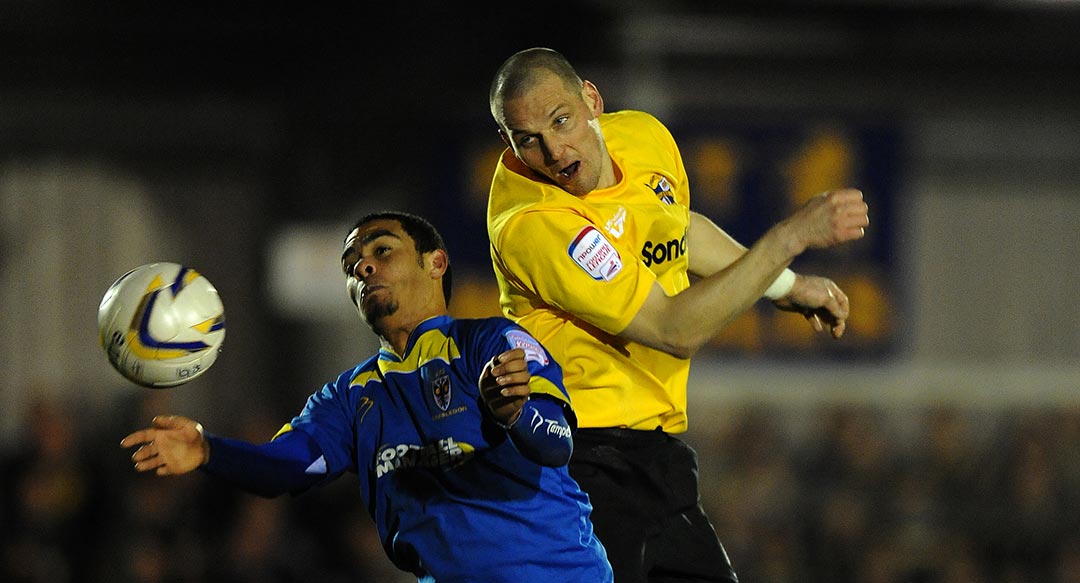
During the course of his 21-year career as a no-nonsense central defender, Darren Purse dealt with every type of striker: Target man, penalty box assassin, speed demon and fleet-footed ball-hogger. Whether the striker hailed from the Premier League’s elite or the League One killing fields, Purse made sure his opponent knew they were in a battle. Here the veteran stopper serves up his top tips for shutting out the danger men...
Get organised
As a defender, organisation and communication are the two main words. If you organise the back four and work with them as a team, then there’s less space for the forward to attack you. Organisation and positional sense are the two main things to consider as a defender, especially a centre half. A well-organised defence never loses its structure. If a player is dragged out of position the back four should work to maintain its shape and fill any gaps that emerge.
Work as a team
Try to get your full backs to tuck in a little tighter. I usually play as the right sided centre half, so I try to get the right back closer to me. The main area where a goal is scored is straight down the middle of the pitch, so if you can push strikers out wide, at least you’re taking them away from your goal. If you try to get your right back to tuck closer to the centre, there is not much space for a striker to operate, forcing him in to the wide areas and away from goal. In this area, a forward will then be running at a mobile full back who can match him for pace instead of a slow centre back.
Hold your position
As a centre back your job is to defend around the penalty box. This is where you should be most comfortable defending. Avoid getting dragged into wide positions as you’ll create a big gap in the centre of your defence. If you do have to get dragged out wide, you need to be sure your full back will cover you in the centre of defence.
The best features, fun and footballing quizzes, straight to your inbox every week.
Aim for distance
When executing a defensive header you want to get height on the ball. The longer the ball is in the air, the more time you have to adjust to it. The further you head it, the more chance you have of condensing the play. If you can head it 20 or 30 yards, it gives the defence the opportunity to push up five or 10 yards.
Heading is all about technique
When competing for a header keep your elbows up. This gives you more stability, but also protection, from centre forwards that have flailing elbows. Make sure you have a good solid base with your feet and head the bottom half of the ball. If you look at the ball as a circle, you want to head a quarter of it. This technique allows you to get height on the ball.
Don’t get too tight
Try not to get tight to quick strikers. They are generally erratic with their first touch. You’ve got to give yourself a couple of yards and drop off goal side. This allows you to reach the ball first if it is played over your head, but you’re still tight enough to be behind him if he receives it into feet, so he can’t turn and start running at you. It’s all about organisation, positioning and getting your distances right when you’re playing against quick centre forwards.
Know your team-mates
As a captain you should make sure all the players are ok and everybody knows their job. Try to be an encouraging captain rather than one that has a go at everybody. There are always players that make mistakes and you would much rather have a shout at them with a few choice words, but if someone loses the ball, try encourage them rather than have a go at them. It’s about knowing your team-mates and how to talk to them. Chat with them one-on-one. This builds a personal relationship and helps organisation, which is very important on the football pitch. A good captain doesn’t always have to give speeches in front of everybody or arrange meetings, but if there’s something that needs to be said, it’s about being the one to stand up and say it.
For more football tips see:
Sylvain Distin: Dominate your opponent
Franco Baresi: How to defend like a master
Chris Smalling: How to be the complete defender
Rio Ferdinand: The thinking man's guide to defending
Ashley Cole: How to handle every opponent
